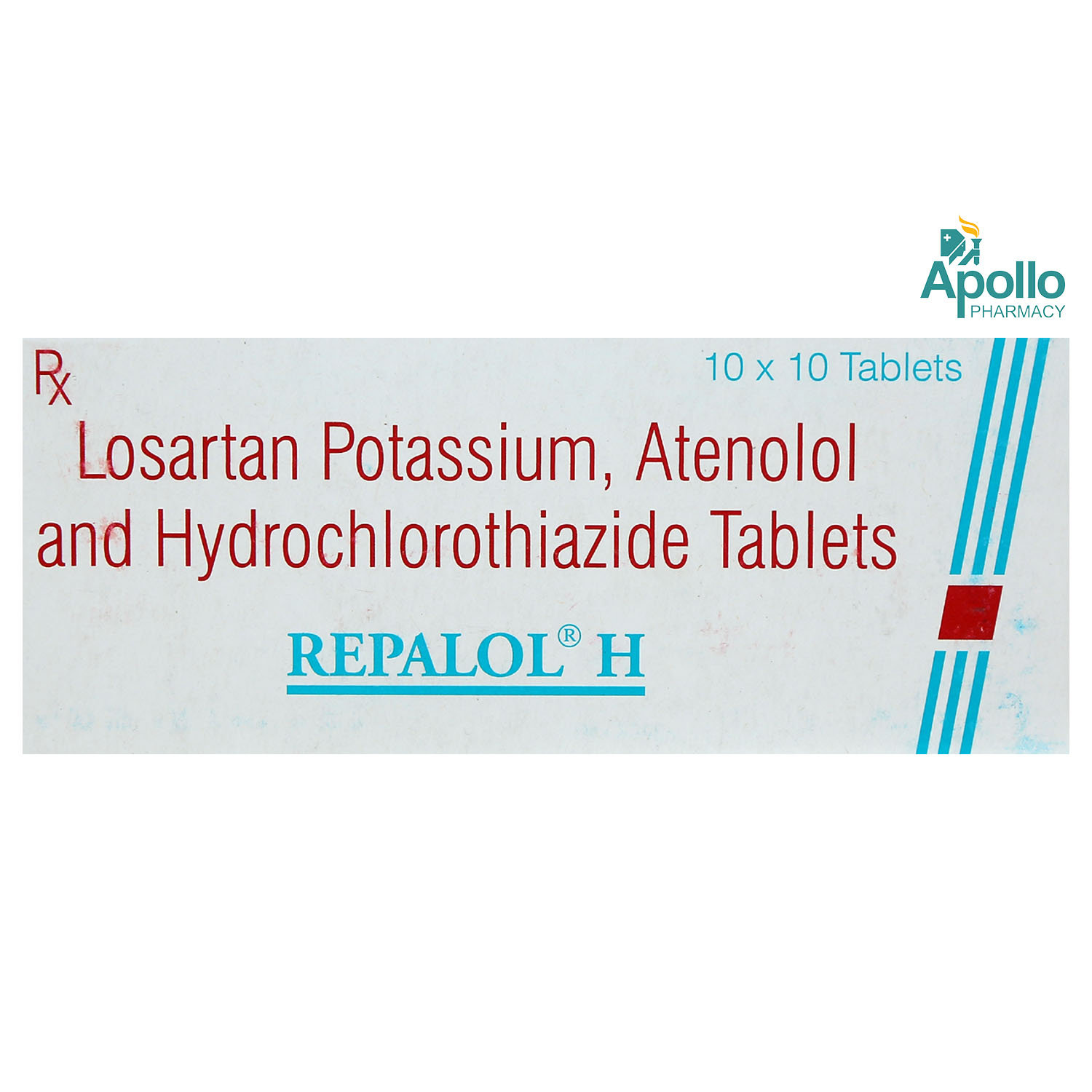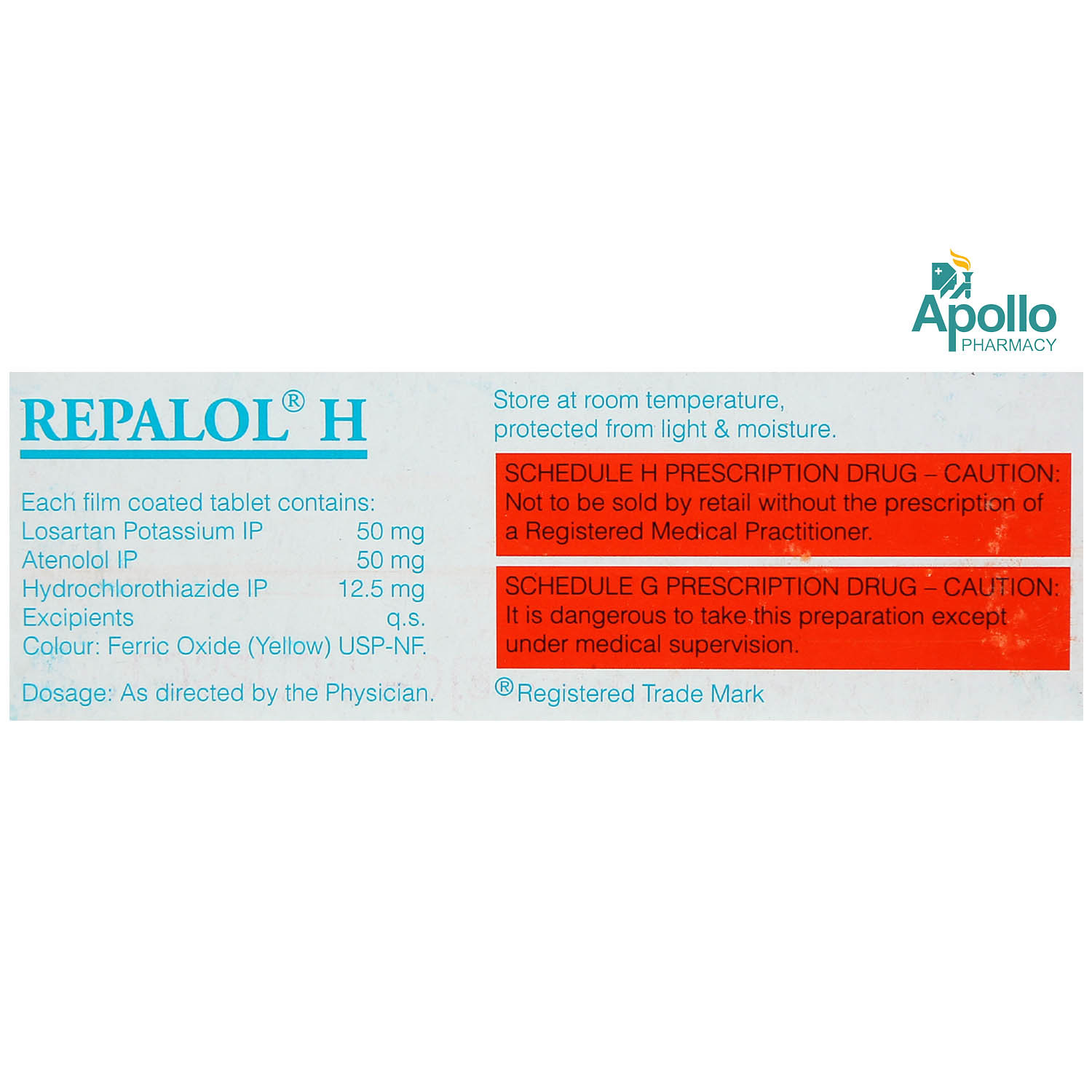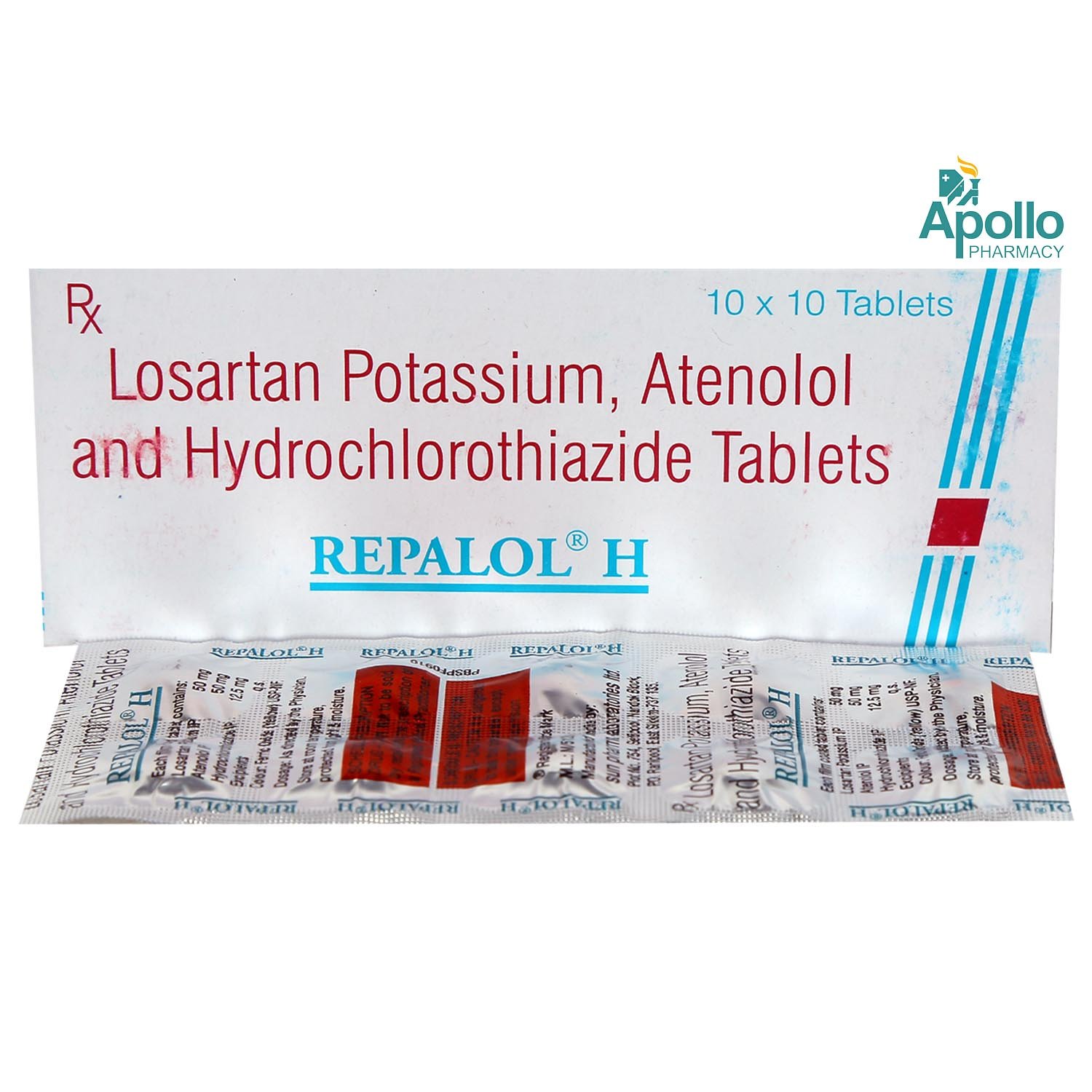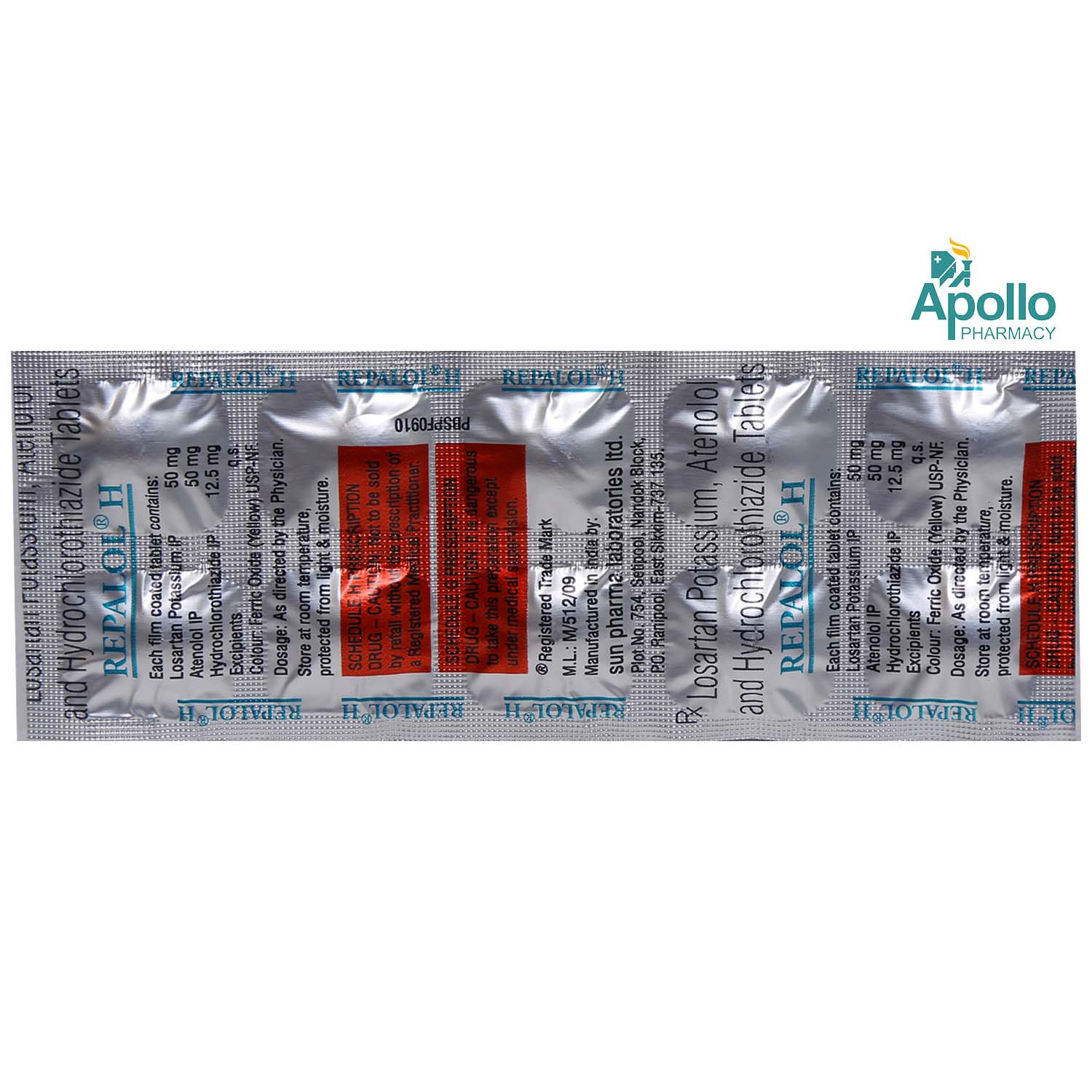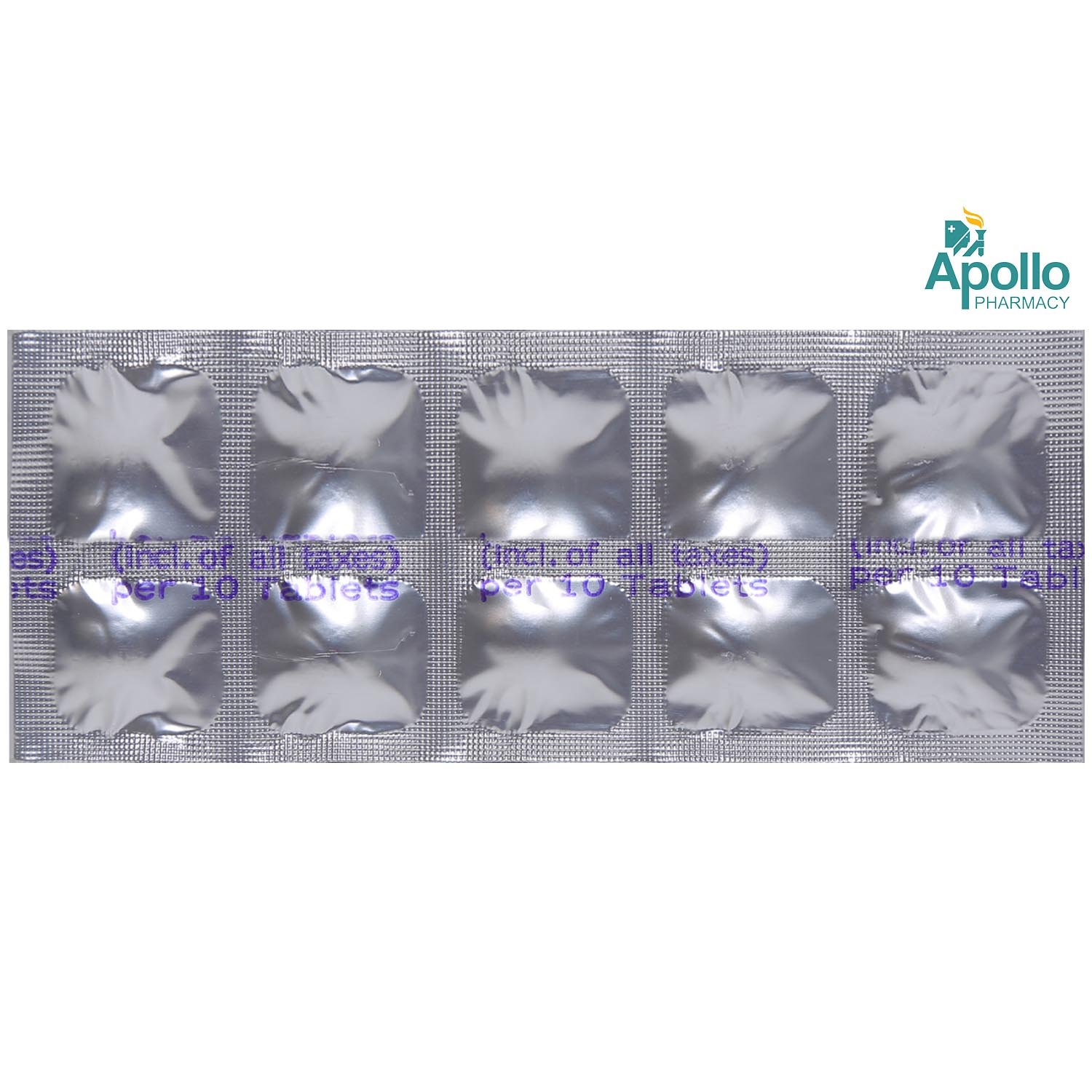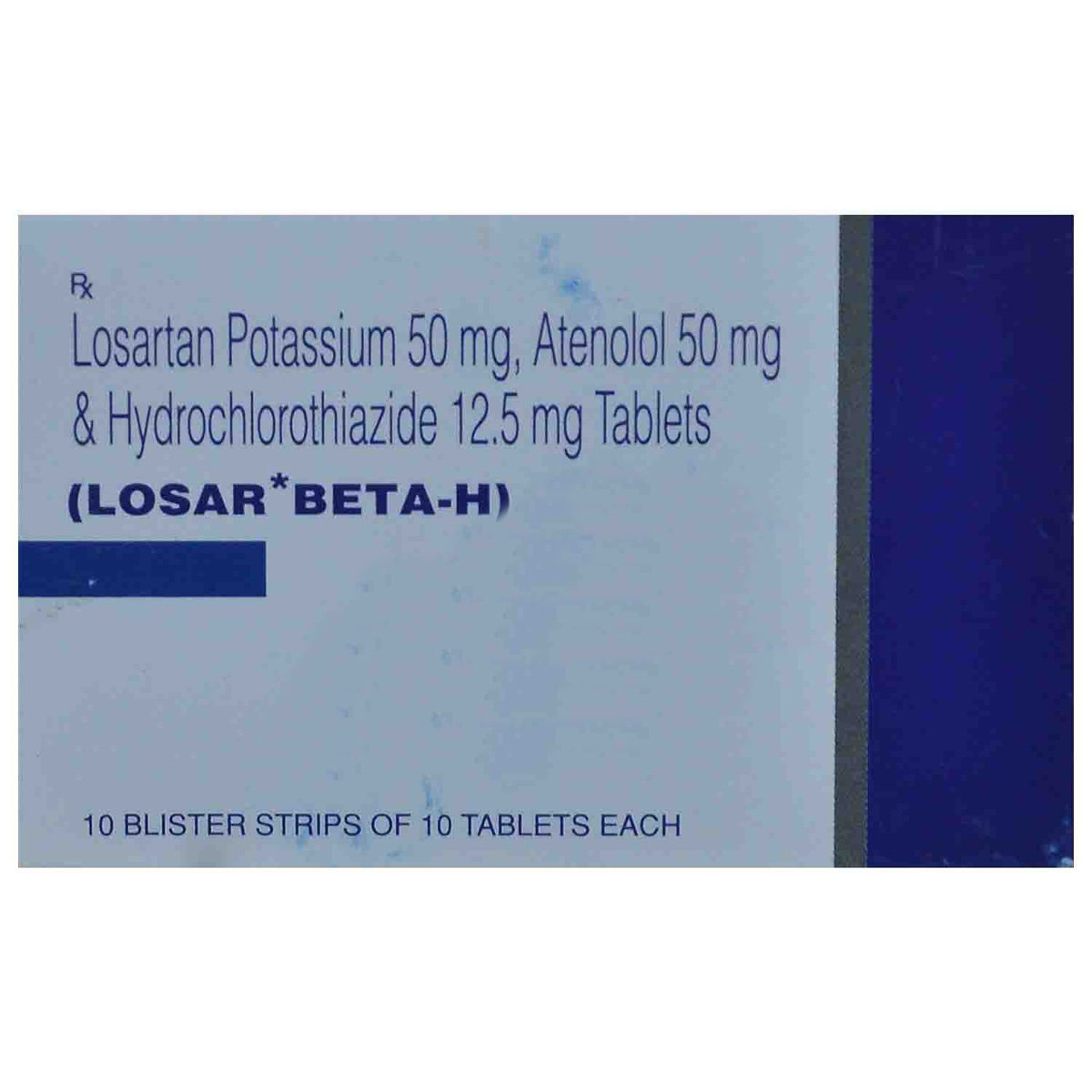Repalol H Tablet 10's
MRP ₹161
(Inclusive of all Taxes)
₹24.1 Cashback (15%)
Provide Delivery Location
Online payment accepted
 Prescription drug
Prescription drugWhats That
Manufacturer/Marketer :
Consume Type :
Expires on or after :
Return Policy :
About Repalol H Tablet
Repalol H Tablet belongs to the class of ‘anti-hypertensive drugs’ primarily used to treat high blood pressure (hypertension). Hypertension is a medical condition, in which the blood exerts high pressure (force exerted by circulating blood) against blood vessel's walls. This condition makes the heart to work harder in pumping the blood to the whole body. Hypertension can cause severe health complications, including stroke, heart failure, heart attack, and kidney failure.
Repalol H Tablet consists of three anti-hypertensive medicines, namely: Losartan, Atenolol, and Hydrochlorothiazide. Losartan is an angiotensin II receptor antagonist which relaxes blood vessels. Hydrochlorothiazide belongs to a class of drugs known as diuretics/'water pills.' It works by causing you to make more urine. This helps your body get rid of extra salt and water . Atenolol is a beta blocker that works specifically on the heart to slow down the heart rate. Repalol H Tablet lowers the raised blood pressure and increases the blood flow by preventing the narrowing of blood vessels. Thus, it prevents angina (heart-related chest pain) and uneven heartbeats (arrhythmias).
In some cases, Repalol H Tablet can cause side effects like sleepiness, taste changes, ankle swelling, headache, dizziness, cold extremities (hands and feet), numbness or tingling in the hands, feet, or lips, tiredness, palpitations (irregular heartbeat) and upset stomach. These side effects are not familiar to everyone and vary individually. If you notice any side effects that are not manageable, please consult your doctor.
Please inform your doctor if you are using any prescription, non-prescription drugs, including vitamins and herbal products. Let your doctor know if you have any allergic reactions to Repalol H Tablet or any other medicines, before starting Repalol H Tablet . Inform your doctor if you have low blood pressure, heart, kidney or liver problems, diabetes, oedema (fluid retention), electrolyte imbalance, muscle disorders, dehydration, breathing problems (asthma, chronic bronchitis, emphysema), and blood circulation problems (Raynaud's disease, peripheral vascular disease). It is advised to consult a doctor if you are a pregnant or breastfeeding mother. Do not stop taking Repalol H Tablet without consulting your doctor since it may worsen your condition and increase the risk of future heart problems. Do not consume alcohol with Repalol H Tablet as it may increase the risk of low blood pressure.
Uses of Repalol H Tablet
Directions for Use
Key Benefits
Repalol H Tablet is an anti-hypertensive medicine that treats high blood pressure (hypertension). It contains three anti-hypertensive medicines, namely: Losartan, Atenolol, and Hydrochlorothiazide. Losartan is an angiotensin II receptor antagonist. It lowers the blood pressure and increases the blood flow by preventing the narrowing of blood vessels. Atenolol is a beta-blocker and is used to treat high blood pressure, angina (chest pain), and uneven heartbeats (arrhythmias). It blocks the action of epinephrine or adrenaline that is released during extreme emotions. This helps in lowering the blood pressure, heart rate and strain on the heart. It reduces the heart rate and makes the heart to pump blood efficiently throughout the body. Atenolol is also used to protect the heart during treatment of a heart attack. Hydrochlorothiazide belongs to the class of diuretics (water pill) with antihypertensive activity. It inhibits sodium reabsorption from absorbing in the kidneys and increases the excretion of sodium, potassium electrolytes, water, and hydrogen ions.
Storage
- Inform your doctor about dry mouth symptoms. They may adjust your medication regimen or prescribe additional medications to manage symptoms.
- Drink plenty of water throughout the day to help keep your mouth moist and alleviate dry mouth symptoms.
- Chew sugar-free gum or candies to increase saliva production and keep your mouth moisturized.
- Use saliva substitutes, such as mouthwashes or sprays, only if your doctor advises them to help moisturize your mouth and alleviate dry mouth symptoms.
- Avoid consuming smoking, alcohol, spicy or acidic foods, and other irritants that may aggravate dry mouth symptoms.
- Schedule regular dental check-ups to keep track of your oral health and handle any dry mouth issues as they arise.
- Inform your doctor about your constipation symptoms. They may adjust your medication or advise alternative treatments.
- Stay hydrated by drinking sufficient of water (at least 8-10 glasses a day) to help soften stool and promote bowel movements.
- Increase fibre intake by eating foods high in fibre, such as fruits, whole grains, vegetables and legumes, to help bulk up the stool.
- Establish a bowel routine by trying to go to the bathroom at the same time each day to train your bowels.
- Engaging in regular exercise, like walking or yoga, can support in bowel movement stimulation.
- Consult your doctor if constipation persists, and discuss alternative treatments or adjustments to your medication.
- Inform your doctor about dizziness symptoms. They may adjust your medication regimen or prescribe additional medications to manage symptoms.
- Follow your doctor's instructions for taking medication, and take it at the same time every day to minimize dizziness.
- When standing up, do so slowly and carefully to avoid sudden dizziness.
- Avoid making sudden movements, such as turning or bending quickly, which can exacerbate dizziness.
- Drink plenty of water throughout the day to stay hydrated and help alleviate dizziness symptoms.
- If you're feeling dizzy, sit or lie down and rest until the dizziness passes.
- Track when dizziness occurs and any factors that may trigger it, and share this information with your doctor to help manage symptoms.
- Remember, managing depression as a side effect of medication requires patience, persistence, and collaboration with your healthcare team.
- Tell your doctor about your depression symptoms to adjust medication.
- Consult a therapist or counsel for emotional support.
- Engage in regular exercise to release endorphins (neurotransmitters).
- Practice stress-reducing techniques like meditation and deep breathing.
- Build a support network of friends, family, and support groups.
- Establish a consistent sleep schedule.
- Eat a nutritious diet rich in fruits, vegetables, and whole grains.
- Limit or avoid alcohol and recreational substances.
- Keep a mood journal to track symptoms and progress.
- Rest well; get enough sleep.
- Eat a balanced diet and drink enough water.
- Manage stress with yoga and meditation.
- Limit alcohol and caffeine.
- Physical activities like walking or jogging might help boost energy and make you feel less tired.
- Exercising regularly helps lower the risk of heart problems.
- Maintain a healthy diet, including vegetables and fruits.
- Rest well; get enough sleep.
- Manage stress with yoga and meditation.
- Limit alcohol and smoking.
Drug Warnings
Avoid the use of Repalol H Tablet in case you have low blood pressure, diabetes, gout, glaucoma, lupus (immune system disorder), hyperkalaemia (high potassium levels), heart problems, undergone heart by pass surgery, oedema (fluid overload), asthma, muscle disorders (myasthenia gravis), breathing problems (asthma, chronic bronchitis, emphysema), blood circulation problems let your doctor know about this. If you are undergoing treatment with heart-related medicine called epinephrine, please inform your doctor before using Repalol H Tablet . Avoid potassium supplements with Repalol H Tablet as it may lead to high potassium levels in the blood. Too much sweating, diarrhoea, or vomiting while using Repalol H Tablet may lead to dehydration, hence it is advised to drink enough fluids. Repalol H Tablet can affect and harm the developing baby during pregnancy. Repalol H Tablet is also excreted into the breast milk. Consult your doctor before using Repalol H Tablet if you are a pregnant or breastfeeding mother. Avoid consumption of alcohol with Repalol H Tablet as it may increase the risk of low blood pressure. Take Repalol H Tablet 4 hours before bedtime to avoid frequent urination during the night.
Drug-Drug Interactions
Drug-Drug Interactions
Login/Sign Up
Taking Cisapride and Repalol H Tablet can increase the risk of an irregular heart rhythm which can be severe. The risk increases in patients with a history of heart illness or electrolyte imbalance.
How to manage the interaction:
Combining Cisapride and Repalol H Tablet together is generally avoided as it can possibly result in an interaction, it can be taken if advised by your doctor. However, if you experience any symptoms like dizziness, lightheadedness, fainting, or fast or pounding heartbeats, consult the doctor immediately. Do not stop using any medications without a doctor's advice.
Taking Dofetilide and Repalol H Tablet can increase the risk of an irregular heart rhythm which can be severe. The risk increases in patients with a history of heart illness or electrolyte imbalance.
How to manage the interaction:
Combining Dofetilide and Repalol H Tablet together is not recommended as it can possibly result in an interaction, it can be taken if advised by your doctor. However, if you experience any symptoms like sudden dizziness, lightheadedness, fainting, shortness of breath, chest pain or tightness, rapid heartbeat, or memory loss, contact your doctor immediately. Do not discontinue any medications without consulting a doctor.
Coadministration of Amiodarone together with Repalol H Tablet may raise the risk of an abnormal heart rhythm.
How to manage the interaction:
Even though Amiodarone and Repalol H Tablet interact, they can be used if prescribed by a doctor. If you have cardiac problems or electrolyte imbalances, you may be at greater risk. If you experience abrupt dizziness, lightheadedness, fainting, shortness of breath, or rapid heartbeat, Weakness, tiredness, drowsiness, confusion, painful muscle cramping, dizziness, nausea, or vomiting, get medical attention. Do not discontinue any medications without consulting a doctor.
The combined use of Tizanidine and Repalol H Tablet can have additive effects in lowering your blood pressure.
How to manage the interaction:
Taking Tizanidine and Repalol H Tablet together can possibly result in an interaction, but they can be taken if advised by your doctor. However, if you experience any symptoms like headache, dizziness, lightheadedness, fainting, and changes in pulse or heart rate, consult a doctor immediately. Do not stop using any medications without a doctor's advice.
Co-administration of Dronedarone and Repalol H Tablet can increase the risk of severe irregular heart rhythm which can be severe. The risk increases in patients with a history of heart illness or electrolyte imbalance.
How to manage the interaction:
Taking Dronedarone and Repalol H Tablet together is avoided as it can possibly result in an interaction, it can be taken if advised by your doctor. However, if you experience any symptoms like dizziness, lightheadedness, fainting, fast heartbeats, weakness, tiredness, drowsiness, confusion, muscle pain, cramps, nausea, or vomiting, consult the doctor immediately. Do not stop using any medications without a doctor's advice.
Co-administration of Droperidol and Repalol H Tablet can increase the risk of an irregular heart rhythm which can be severe. The risk increases in patients with a history of heart illness or electrolyte imbalance.
How to manage the interaction:
Taking Droperidol and Repalol H Tablet together can possibly result in an interaction, but they can be taken if advised by your doctor. However, consult the doctor immediately if you experience any symptoms like dizziness, lightheadedness, fainting, fast heartbeats, weakness, tiredness, drowsiness, confusion, muscle pain, cramps, nausea, or vomiting. Do not stop using any medications without a doctor's advice.
Taking Ziprasidone and Repalol H Tablet can increase the risk of an irregular heart rhythm which can be severe. The risk increases in patients with a history of heart illness or electrolyte imbalance.
How to manage the interaction:
Taking Ziprasidone and Repalol H Tablet together is avoided as it can possibly result in an interaction, but it can be taken together if prescribed by a doctor. However, consult your doctor if you experience sudden dizziness, lightheadedness, fainting, shortness of breath. Do not discontinue any medications without consulting a doctor.
Coadministration of Aminolevulinic acid with Repalol H Tablet can make your skin more sensitive to bright lights. This could increase the risk or severity of developing a sunburn.
How to manage the interaction:
Although there is a possible interaction between Aminolevulinic acid and Repalol H Tablet, it can be taken if advised by your doctor. Avoid exposure of the eyes and skin to sunlight or bright indoor lights for 48 hours. Do not stop using any medications without a doctor's advice.
Coadministration of Lithium and Repalol H Tablet can increase the effects of lithium.
How to manage the interaction:
Taking Lithium and Repalol H Tablet together can possibly result in an interaction, but it can be taken if advised by your doctor. However, if you experience any symptoms like loose stools, vomiting, drowsiness, shaking of hands and legs, thirst, increased urination, lack of coordination, or muscle weakness, consult the doctor immediately. Do not stop using any medications without a doctor's advice.
Co-administration of Arsenic trioxide and Repalol H Tablet can increase the risk of an irregular heart rhythm which can be severe. The risk increases in patients with a history of heart illness or electrolyte imbalance.
How to manage the interaction:
Taking Arsenic trioxide and Repalol H Tablet together is avoided as it can possibly result in an interaction, it can be taken if advised by your doctor. However, if you experience any symptoms like dizziness, lightheadedness, fainting, fast heartbeats, weakness, tiredness, drowsiness, confusion, muscle pain, cramps, nausea, or vomiting. consult the doctor immediately. Do not stop using any medications without a doctor's advice.
Drug-Food Interactions
Drug-Food Interactions
Login/Sign Up
Diet & Lifestyle Advise
- Reduce sodium intake in your diet to maintain your blood pressure.
- Eat natural and healthy foods by cutting down on high on sodium processed foods.
- Lose those extra pounds, since being obese can be a risk factor for hypertension.
- Exercise regularly to maintain good heart health.
- Avoid smoking and alcohol intake.
- Chronic stress may also cause high blood pressure. Therefore, avoid stress triggers and make time for yourself to relax and do activities that you enjoy.
- Try to include heart-healthy omega 3 fatty acids containing food drinks in your daily diet. You can also use low-fat cooking oil like olive oil, soybean oil, canola oil, and coconut oil to lower your elevated blood pressure.
- Limit sodium chloride intake (table salt) in your daily diet to 2300 mg per day or less than 1500 mg is ideal for most adults.
Side Effects of Repalol H Tablet
- Sleepiness
- Taste changes
- Ankle swelling
- Headache
- Dizziness
- Cold extremities (hands and feet)
- Numbness or tingling in the hands, feet, or lips,
- Tiredness
- Palpitations (irregular heartbeat)
- Upset stomach
- Slow heart rate
- Electrolyte imbalance
Habit Forming
Therapeutic Class
All Substitutes & Brand Comparisons
RX
LOSAR BETA H TABLET
Unichem International
₹213
(₹19.17 per unit)
32% COSTLIER
Author Details
We provide you with authentic, trustworthy and relevant information
Drug-Diseases Interactions
Drug-Diseases Interactions
Login/Sign Up
FAQs
Drug-Drug Interactions Checker List
- AMLODIPINE
- ALISKIREN
- BENAZEPRIL
- LISINOPRIL
- FUROSEMIDE
- ALPRAZOLAM
- LITHIUM
- ESOMEPRAZOLE
- CHOLECALCIFEROL
- NAPROXEN
- IBUPROFEN
- FINGOLIMOD
- DOLASETRON
- DOFETILIDE
- PREGABALIN
- CHOLESTYRAMINE
- COLESTIPOL
- DROSPIRENONE
Special Advise
- You may be asked by your doctor to undergo blood and urine tests, if you have been suffering from vomiting or dehydration.
- Thiazide diuretics like Hydrochlorothiazide may increase serum triglyceride and cholesterol levels. Hence it is advised to monitor your cholesterol levels regularly.
- Therapy with Repalol H Tablet should be discontinued if you have been suggested tests for parathyroid function in cases like hyperparathyroidism.
- Your doctor may also suggest thyroid function tests since thiazide diuretics like Hydrochlorothiazide may decrease serum PBI (protein-bound iodine) levels.
- Regular monitoring of electrolytes as advised by your doctor
Disease/Condition Glossary
Hypertension is a medical condition in which blood pressure is elevated persistently in the arteries. It is considered as an essential risk factor for cardiovascular diseases and can be caused due to obesity, diabetes, smoking, high salt intake, stress, lack of physical activity or ageing. Blood pressure is measured in the ratio of systolic pressure to diastolic pressure. Systolic pressure is the pressure when the heart pumps blood out. On the other hand, diastolic pressure is the pressure when your heart is at the resting stage between heartbeats. If your blood pressure is 140/90 mm of Hg, it means the systolic pressure is 140 mm of Hg and, diastolic pressure is 90 mm of Hg. Ideal blood pressure range lies in between 90/60 mmHg and 120/80 mmHg. If the blood pressure is 140/90 mmHg or greater, it is considered high blood pressure.

Have a query?
Alcohol
Safe if prescribed
It is unsafe to consume alcohol, since alcohol consumption with Repalol H Tablet may increase the risk of low blood pressure and cause adverse effects, such as dizziness, fainting, light-headedness or headache.
Pregnancy
Consult your doctor
Repalol H Tablet is not recommended and unsafe in pregnancy. It can affect and harm the developing baby. Consult your doctor before taking Repalol H Tablet if you plan to become pregnant or already pregnant. Your doctor will weigh the potential risks and benefits before prescribing Repalol H Tablet .
Breast Feeding
Consult your doctor
Atenolol and Hydrochlorothiazide in Repalol H Tablet are excreted into the breast milk. It is not recommended to use Repalol H Tablet during breastfeeding. Please consult your doctor for more information before taking Repalol H Tablet if you are a nursing mother.
Driving
Safe if prescribed
Repalol H Tablet may cause side effects like dizziness, headaches, nausea or tiredness, which can affect your ability to concentrate and drive. Hence, it is recommended not to drive or operate machinery until you are mentally alert.
Liver
Consult your doctor
Let your doctor know if you have any history of liver diseases before taking Repalol H Tablet . The dosage will be initiated in lower doses and will be further increased in patients with liver diseases. However, Repalol H Tablet is not recommended in patients with severe hepatic impairment.
Kidney
Consult your doctor
Repalol H Tablet may affect the kidney functioning. Hence it is advised to seek doctor advice before starting Repalol H Tablet if you have kidney problems. However, it is not recommended in patients with severe renal impairment.
Children
Safe if prescribed
Safety and effectiveness of Repalol H Tablet in paediatric patients has not been established. Please seek medical advice for more information.
Recommended for a 30-day course: 3 Strips

